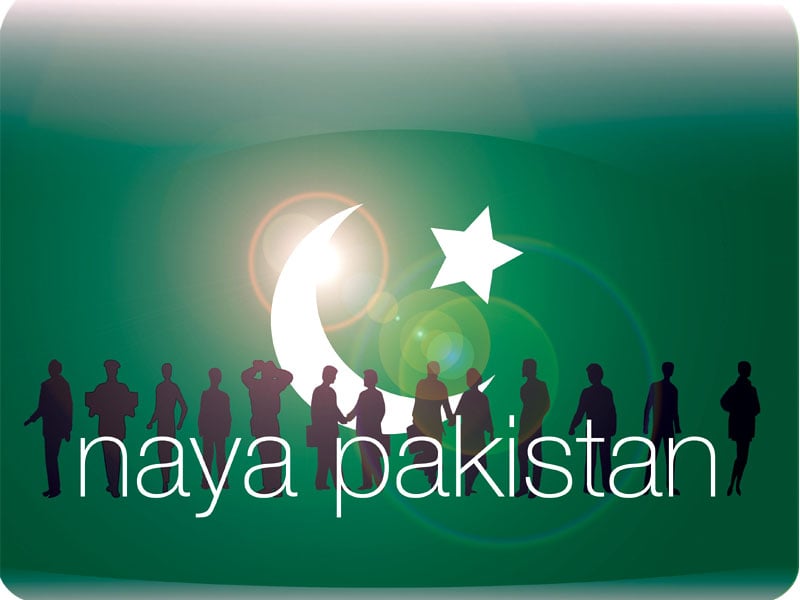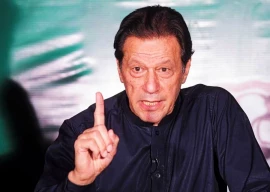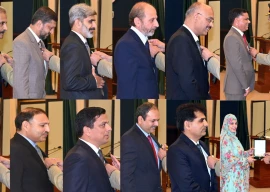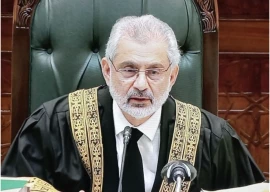
If you had imagined waking up the morning after Election Day to a spanking new, Naya Pakistan, then the campaign devised by the Pakistan Tehreek-e-Insaf worked on you as intended.
On the eve of May 11, not only were many celebrating the completion of a democratically-elected government’s tenure, but there were also whispers and chants of a “Naya Pakistan”. The two words invaded every facet of our lives, from social media and television to radio and the very streets of major cities. More than a slogan, the phrase became part of popular culture, and was used in a song, internet memes and also in debates between political parties. The Express Tribune talks to the man who helped create the slogan for PTI.
“The Naya Pakistan [campaign] created excitement about taking part in elections amongst a class that detested politics,” says Shavaar Ali Khan, head of Farigh Four, the advertising firm which chalked out the Naya Pakistan campaign for the PTI. “It created awareness about political culture.”
Although the party did not score majority seats in the National Assembly, the party’s well-marketed slogan spoke about change, and encouraged citizens to make it to the ballot box.
“We were approached by the PTI’s brand team, and treated the client as a brand. Other examples similar to the PTI are the Barack Obama campaign and the Indian party BJP’s Shining India campaign,” explains Shavaar.
PTI’s brand team, which includes Salman Amjad, Salman Danish Naseer, Faisal Javed and Asad Umar, had approached Farigh Four to devise a marketing strategy that would represent change. Creating the right mix meant defining what exactly that change is. “Change as a buzzword was associated with Obama, so we had to come up with a slogan that defined change. Naya Pakistan was the answer.”
The Farigh Four team started to work with the PTI to design a campaign that would entice a citizen to vote. The campaign became the firm’s flagship project. “The idea was to get new voters who had never voted before and to create a campaign that is not specifically focused on any party because the target audience, which was meant to be reached, was completely apolitical,” narrates Shavaar. It is important to not here that voter turn-out on May 11, 2013 was the highest in Pakistan’s history, at 60%.
With the aim of permeating all segments of society, Farigh Four’s team with Beenish Mir and Shehzad Ahmed on board, started to work on the slogan. “We had to come up with a concept which was not only pan-Pakistan, but also something that would raise the PTI above regular politics,” explains Shavaar. “The different slogans that we came up with were ‘Banega Naya Pakistan’ and ‘Naya Banega Pakistan’.”
PTI chairman Imran had started to chant the Naya Pakistan slogan by the end of 2012. Meanwhile, behind the scenes, the PTI was laying the foundation for one of the biggest media campaigns in Pakistan’s history.
“The idea was to not let the slogan get lost amidst aggressive election campaigns by other political parties and since youngsters were the primary target, it had to be something which could stay with them. The campaign resulted in the birth of a new political class — people who were inspired by the dream of Naya Pakistan,” asserts Shavaar.
Working with Imran
Shavaar says that cricketer-turned-politician Imran was open to new initiatives. The man behind the campaign says that the openness was due to the “culture of meritocracy within the party.”
“Whether you agree with him politically or not, he [Imran] has charisma and leadership qualities that he tries to inculcate in the youth. He is very encouraging,” expresses Shavaar. “He [Imran] has a set of advisers, but he is the kind of guy who does what he wants. So, a lot of things that we did spontaneously, like creating the buzzwords such as tabdeeli [change] or Naya Pakistan, he kind of inherently started to use them.”
Published in The Express Tribune, May 16th, 2013.
Like Life & Style on Facebook for the latest in fashion, gossip and entertainment.
COMMENTS (15)
Comments are moderated and generally will be posted if they are on-topic and not abusive.
For more information, please see our Comments FAQ











































in the old days, when an agency or a producer did commercial work for a political party, they were labelled sell-outs or as unethical because they were now 'political'. Today is the same case for those who worked on all campaigns except for the PTI campaign. Why? Because it's in fashion to be PTI, vote PTI, etc. All of 'civil society' has joined the PTI camp and are still trying to call themselves apolitical. Jiyalas are jiyalas - whether burger jiyalas for Imran Khan, sindhi jiyalas for PPP or dhol walay PML-N jiyalas, let's please get on with things and be democratic, let Nawaz Sharif do his job now.
@S A Bukhara: Both PML(n) & PTI has same policy on that issue so why just target PTI when PMN clearly has links with banned outfits? In long run we can only get rid of such issues with better education system & justice system which only PTI can give not some one who's bodyguards beat up poor bakery workers in broad day light in Lahore. I know where you're coming from .. I was oppose to that policy of negotiation too but on national level only PPP is against negotiation policy and they were clearly out of contest
Farigh Four has Farighed PTI. Who did PTI's ad campaign ? If it was done by the FF then it was literally farigh. 8/10 points for Tagline.
@Tahir: You are right. People came to vote, and a record turnout of 300% was created in some parts of Pakistan.
One thing has definitely emerged NEW....people voted PML N but nation voted for PTI....that is CHANGE....
It was a great campaign and people all over Pakistan and even in foreign had one thing in mouth on the day of election that was Naya Pakistan.
For me, Naya Pakistan came the day Imran Khan decided to join politics. Corruption, Good Governance, Declaration of Assets, No militant wings, Independence from Foreign Aid, Drone, these are issues no one else talked about other than Imran Khan. He has changed Pakistan forever, whether his party won or not. He has already given us, a Naya Pakistan
nothing new here, same ploy was used by Obama with his yes we can/Hope/Change slogan...pakistanis are typically emotional people specially youth who hardly rationalize the words our leaders feed them. Actual manifestation of that rhetoric is much much harder. Change should start from with in, I commend the campaigners for raising awareness in the burger class of pakistan. InshAllah this will help us move forward to the direction of democracy..but i encourage everyone to be realistic rather than idealistic...
Credit goes to PTI and most importantly to all those people who are striving for the change......I hope and pray to ALLAH (SWT) to bring happiness to everyone in Pakistan.
The good looking Jamaat I islami has joined the old Jamaat I Islami. Welcome to Naya Pakistan
Well the campaign did work but not just in favour of PTI. People did come out to vote but mostly in favour of PML-N.
Didn't Naya Pakistan come about from the Vital Signs reunion song though? Excuse my divorcement from the whole media scene please, genuinely just asking.
superb work done by u guys... NAYA PAKISTAN has started from KPK.. GOD bless u people
Impressive campaign that increased the turnout. Too bad N took the benefit!
Bhai sb, pehle purana tou sambhal letay hai, then we will go for Naya one